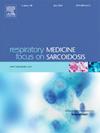Mepolizumab治疗和减少口服皮质类固醇暴露可改善严重嗜酸性粒细胞哮喘患者的抑郁和焦虑症状:来自澳大利亚Mepolizumab登记处的数据
IF 3.1
3区 医学
Q2 CARDIAC & CARDIOVASCULAR SYSTEMS
引用次数: 0
摘要
口服皮质类固醇(OCS)管理方法(包括单克隆抗体治疗严重哮喘)在减少毒性OCS暴露和相关合并症(如抑郁和焦虑)方面的益处需要实际评估。方法:这项真实世界的观察性研究调查了澳大利亚Mepolizumab注册中心(n = 412)登记的患者中OCS暴露和相关并发症超过24个月。结果患者中位年龄59岁,女性占58%。开始治疗前一年接受OCS突发的患者比例为95%(治疗第二年为44%,p < 0.001)。在基线前一年,64%的人接受了毒性水平的OCS暴露(≥1000 mg),有更多的疾病负担和医生诊断的抑郁症(27% vs 15%, p = 0.020)。在mepolizumab治疗的第二年,持续的毒性水平暴露减少到25% (p < 0.001)。在基线时,42%的患者需要维持OCS,治疗两年后降至18% (p < 0.001)。医院焦虑和抑郁量表(HADS)-抑郁评分≥8分的患者在基线时为37%,两年后降至15% (p < 0.001)。两年后,hads -焦虑评分≥8分的患者比例从44%降至25% (p < 0.001)。HADS评分的改善与哮喘生活质量问卷评分的改善相关。结论:mepolizumab治疗降低了严重嗜酸性粒细胞哮喘患者暴露于OCS毒性水平,并减少了相关并发症,证实了OCS管理举措的重要性。哮喘结局和临床相关可治疗特征(包括抑郁和焦虑)的改善,进一步突出了生物制剂在OCS管理框架中的作用。本文章由计算机程序翻译,如有差异,请以英文原文为准。
Mepolizumab treatment and reduced oral corticosteroid exposure improves symptoms of depression and anxiety in severe eosinophilic asthma: data from the Australian Mepolizumab Registry
Background
The benefits of oral corticosteroid (OCS) stewardship approaches -including monoclonal antibody treatments for severe asthma- on reducing toxic OCS exposure and related comorbidities such as depression and anxiety require real-world evaluation.
Methods
This real-world observational study investigated OCS exposure and associated complications over 24 months in patients enrolled in the Australian Mepolizumab Registry (n = 412).
Results
Patients were median age 59 years, 58 % were female. The proportion of patients receiving OCS burst in the year prior to commencement was 95 % (44 % during second year of treatment, p < 0.001). In the year prior to baseline, 64 % received toxic level OCS exposure (≥1000 mg), with more disease burden and doctor diagnosed depression (27 % v 15 %, p = 0.020). Ongoing toxic level exposure was reduced to 25 % of patients in the second year of mepolizumab treatment (p < 0.001). At baseline, 42 % required maintenance OCS which reduced to 18 % after two years of treatment (p < 0.001). Hospital Anxiety and Depression Scale (HADS)-Depression score ≥8 was evident in 37 % of patients at baseline and reduced to 15 % after two years (p < 0.001). HADS-Anxiety score ≥8 was reduced from 44 % of patients to 25 % after two years (p < 0.001). Improvements in HADS scores correlated with improvement in Asthma Quality of Life Questionnaire score.
Conclusion
Mepolizumab treatment reduces exposure to toxic levels of OCS in severe eosinophilic asthma, with reduction in associated complications, confirming the importance of OCS stewardship initiatives. Improvements in both asthma outcomes, and clinically relevant treatable traits including depression and anxiety, further highlights the role of biologics within the OCS stewardship framework.
求助全文
通过发布文献求助,成功后即可免费获取论文全文。
去求助
来源期刊

Respiratory medicine
医学-呼吸系统
CiteScore
7.50
自引率
0.00%
发文量
199
审稿时长
38 days
期刊介绍:
Respiratory Medicine is an internationally-renowned journal devoted to the rapid publication of clinically-relevant respiratory medicine research. It combines cutting-edge original research with state-of-the-art reviews dealing with all aspects of respiratory diseases and therapeutic interventions. Topics include adult and paediatric medicine, epidemiology, immunology and cell biology, physiology, occupational disorders, and the role of allergens and pollutants.
Respiratory Medicine is increasingly the journal of choice for publication of phased trial work, commenting on effectiveness, dosage and methods of action.
 求助内容:
求助内容: 应助结果提醒方式:
应助结果提醒方式:


